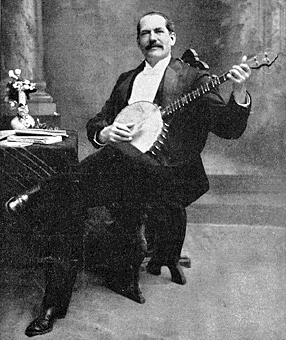Polk Miller facts for kids
Quick facts for kids
Polk Miller
|
|
|---|---|
 |
|
| Background information | |
| Born | August 2, 1844 Prince Edward County, Virginia, United States |
| Died | October 20, 1913 (aged 69) |
| Occupation(s) |
|
| Instruments |
|
Polk Miller (born August 2, 1844 – died October 20, 1913) was a talented musician and entertainer. He came from Richmond, Virginia. He was also a pharmacist, which means he prepared and sold medicines. Miller was also the person who started Sergeant's Pet Care Products, Inc.
Contents
Early Life and Business
Polk Miller was born in Prince Edward County, Virginia in August 1844. As he grew up, he learned to play the banjo from people working on his family's farm. In 1860, he became a pharmacist in Richmond. During the American Civil War, he served as a soldier.
At his drugstore in Richmond, Miller started making special remedies. He made them for Sergeant, his favorite hunting dog. Soon, his friends discovered these remedies worked well for their dogs too. In 1868, Miller began selling these products in his drugstore. This was the start of Sergeant's Pet Care Products, Inc. The company's official name was set in 1886. By 2007, Sergeant's sold over 400 different pet care products.
A Musician's Journey
In 1892, Polk Miller began performing music professionally. During the 1890s, he had a solo act. He would play the banjo, sing songs, and tell stories. Miller was already successful from his drugstore business. He often used his performances to raise money for good causes. These included church repairs and helping soldiers who had fought in the Civil War.
The Old South Quartette
Polk Miller also performed with his "Old South Quartette." Their show featured "Stories, Sketches and Songs." These performances showed what African American life was like before the Civil War. Miller was white, and the four members of the quartet were black. For a long time, only two of the many black singers in the quartet were widely known: James L. Stamper and Randall Graves. More research has since found the names of five others: Anderson Epps, Archie Johnson, Clarence Smith, Alphonso DeWitt, and Walter Lightfoot.
The group became famous across the country. They toured between 1900 and 1911. They stopped touring because they were worried about the dangers of traveling as a racially mixed group.
Famous Performances
At one performance, the famous writer Mark Twain introduced Polk Miller. This happened at Madison Square Garden in New York City. Miller did not wear blackface, which was common for performers at the time. However, he sometimes called himself "The Old Virginia Plantation Negro." He performed Negro spirituals and popular folk songs. One famous song he sang was "Carry Me Back to Old Virginny."
Miller and his quartet performed at colleges and military schools. They also played at very fancy social clubs in big cities. These cities included New York, Boston, Baltimore, Washington, Pittsburgh, and Cleveland. Polk Miller and the Old South Quartette also performed at African American churches.
Early Recordings
Polk Miller and the Old South Quartette were featured on some of Thomas Edison's early phonograph recordings. These were like the first record players. In 2008, a music company released a collection of these recordings. It included seven 1909 Edison cylinder records.
Later Life and Legacy
Polk Miller passed away on October 20, 1913. He was buried in Richmond's Hollywood Cemetery.
Polk Miller's personal scrapbook is now kept at the Valentine Museum in Richmond. This scrapbook is special because it shows the problems the group faced. They experienced racial discrimination as they traveled and toured across the United States.
A few miles west of Richmond, there is a town called Bon Air. A street there, Polk Street, was named in honor of Polk Miller. Bon Air Elementary School also inspired a series of children's books. These books, written by Patricia Reilly Giff, are about "the kids of the Polk Street School."
Miller's recorded songs have even appeared in modern times. His versions of "Old-Time Religion", "The Bonnie Blue Flag", and "Watermelon Party" are in the 2013 video game BioShock Infinite.
 | Selma Burke |
 | Pauline Powell Burns |
 | Frederick J. Brown |
 | Robert Blackburn |

